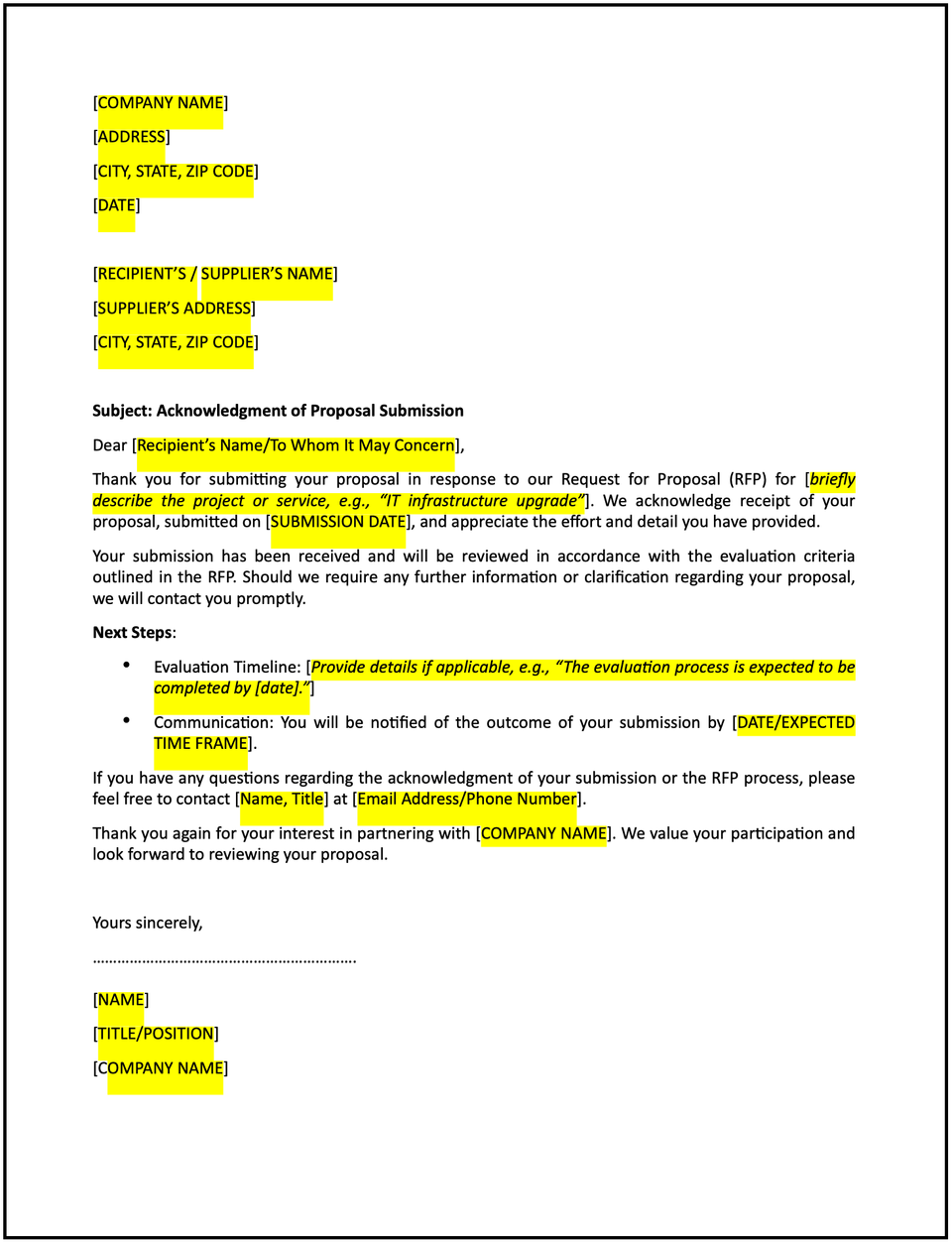Letter of request for proposal (RFP) submission acknowledgment: Free template

Letter of request for proposal (RFP) submission acknowledgment
A letter of request for proposal (RFP) submission acknowledgment is a formal communication sent to a supplier or vendor to confirm receipt of their submitted proposal. This letter ensures transparency, acknowledges the vendor’s effort, and outlines the next steps in the RFP evaluation process.
How to use this letter of request for proposal (RFP) submission acknowledgment
- Open with an introduction: Address the recipient respectfully and reference the RFP by name or identification number.
- Confirm receipt: Clearly acknowledge that their proposal has been received and express appreciation for their submission.
- Provide a brief summary: If applicable, mention key details such as the proposal’s submission date or any specific areas covered in their proposal.
- Outline next steps: Share a timeline or process for evaluating proposals, including when decisions will be made or when the vendor can expect updates.
- Highlight your commitment: Reassure the recipient that their submission will be reviewed thoroughly and fairly.
- Maintain a professional tone: Ensure the letter is clear, respectful, and focused on fostering a positive relationship.
- Provide contact information: Include details for the recipient to reach out with questions or clarifications.
Benefits of using a letter of request for proposal (RFP) submission acknowledgment
This letter ensures a structured and professional way to confirm receipt of a proposal, fostering trust and clarity. Here’s how it helps:
- Promotes transparency: Acknowledging receipt reassures vendors their submission has been received.
- Reflects professionalism: A well-crafted letter demonstrates respect and a commitment to fair processes.
- Builds trust: Clear communication fosters confidence in the evaluation process.
- Encourages engagement: Acknowledging effort strengthens relationships with vendors.
- Sets expectations: Outlining the next steps helps vendors understand the timeline and process.
Tips for writing an effective letter of request for proposal (RFP) submission acknowledgment
- Be specific: Clearly reference the RFP by name or identification number to avoid ambiguity.
- Use professional language: Maintain a respectful and appreciative tone to foster trust.
- Provide context: Briefly explain the next steps in the evaluation process to set clear expectations.
- Highlight fairness: Reassure the recipient of a thorough and unbiased review of their proposal.
- Include actionable steps: If necessary, include instructions for follow-ups or additional documents.
- Keep it concise: Focus on the key points while ensuring the tone is professional and positive.
Frequently asked questions (FAQs)
Q: What details should I include in this letter?
A: Include the RFP reference, confirmation of receipt, a brief timeline of next steps, and contact details for follow-up.
Q: Should I personalize the letter?
A: Yes, addressing the recipient by name and referencing their specific proposal demonstrates attentiveness.
Q: Who typically sends this letter?
A: Procurement managers, project leads, or organizational representatives overseeing the RFP process typically send this letter.
Q: How formal should this letter be?
A: The tone should be professional and respectful, focusing on fostering a positive relationship.
Q: When should this letter be sent?
A: Send the letter promptly after receiving the proposal to reassure the vendor.
Q: Can this letter include feedback on the submission?
A: Typically, acknowledgment letters do not include feedback; feedback is usually provided after evaluations are complete.
Q: Is acknowledgment from the recipient required?
A: While not necessary, requesting acknowledgment ensures the vendor knows their submission has been logged.
This article contains general legal information and does not contain legal advice. Cobrief is not a law firm or a substitute for an attorney or law firm. The law is complex and changes often. For legal advice, please ask a lawyer.


